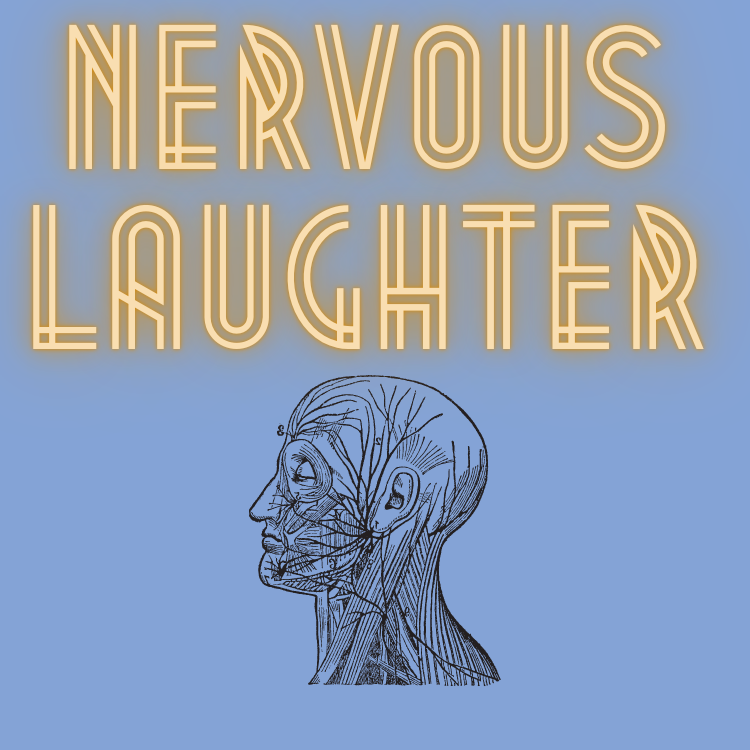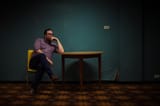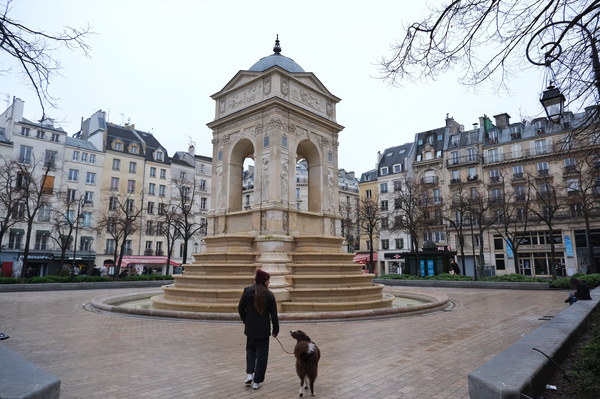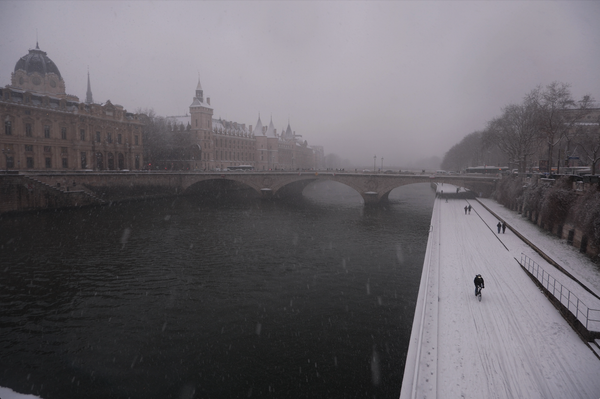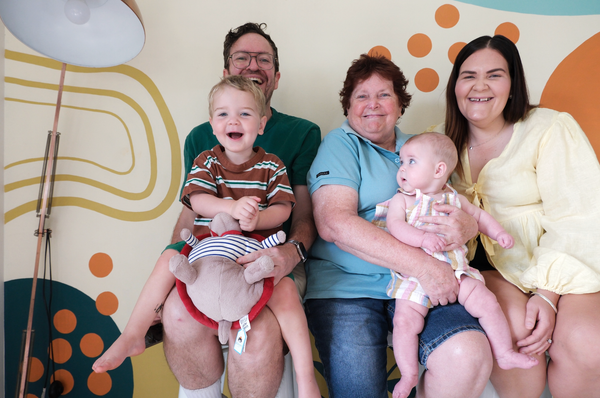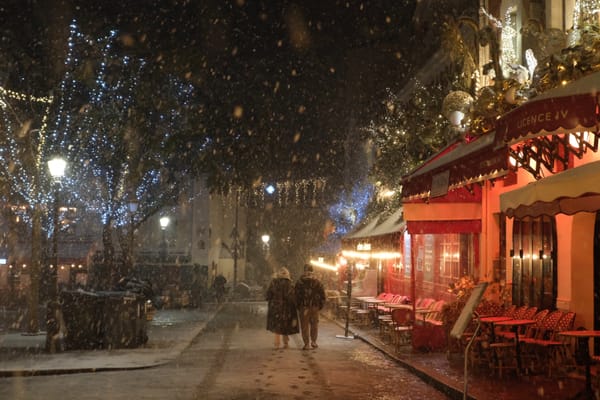No Genou is Bad News
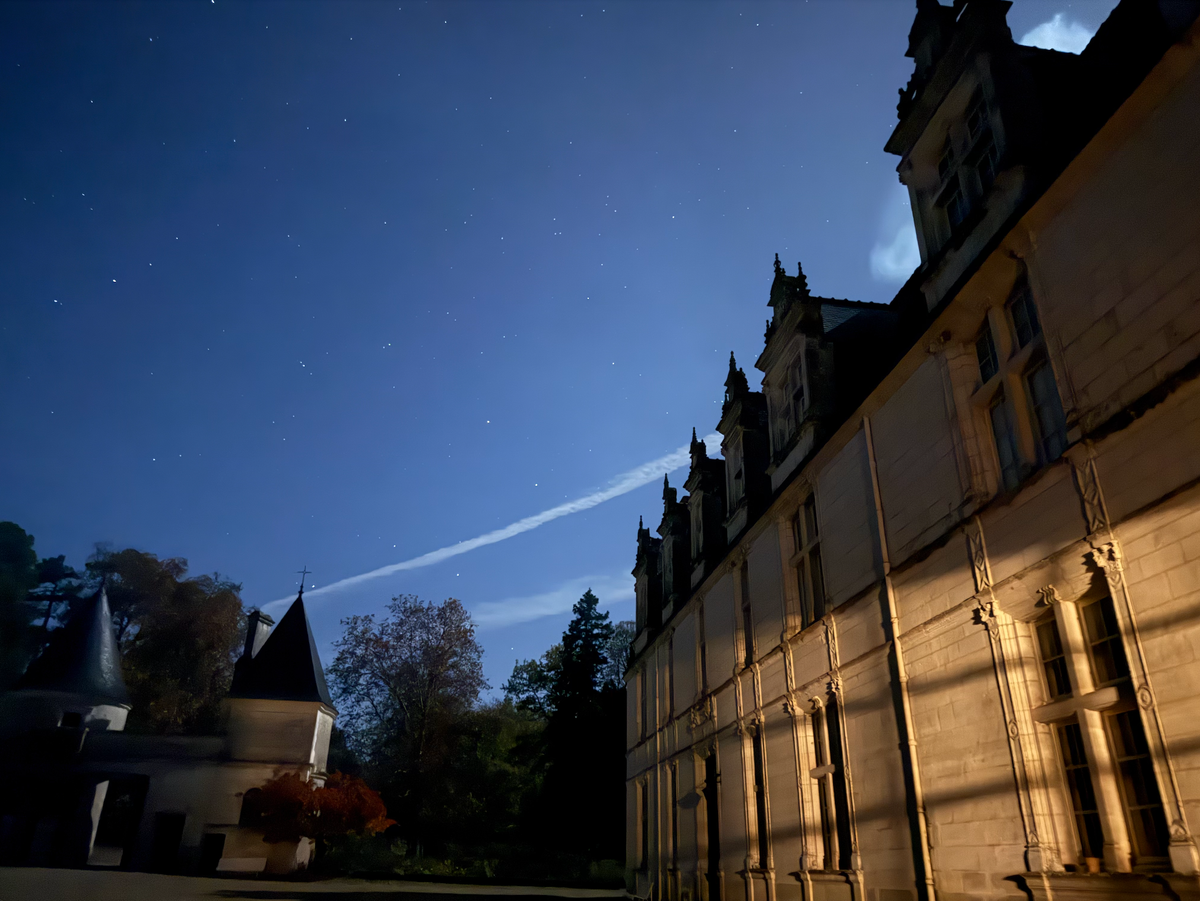
This horror story begins with a wandering brass band; my sirens.
I will follow a brass band anywhere. There is just something about the way a tuba cuts a shape on the horizon – so brash, so untoward – that gets my motor running. The string band played as the Titanic went down and I'd have stayed to listen, in agonising beauty, but a brass version would have had me on the buckets bailing water.
On the first weekend of November it was a misting, cold day with patches of blue sky appearing between sweeping grey clouds. I left my regular coffee shop and embarked on my routine circuit of the Montmartre butte via my daily bread, pain au chocolat. Halfway around the hill I heard the distant jangle of the brass instruments and the voice of a soprano filleting the air. I followed both like Pepé le Pew on the trail of an indecent musk and there, by the side of the road, was a troupe of performers. Oh they were fun: jumping in passing cars with trumpets and saxophones blaring, forcing a public bus to stop and open its doors so the tuba player could run down the aisle.
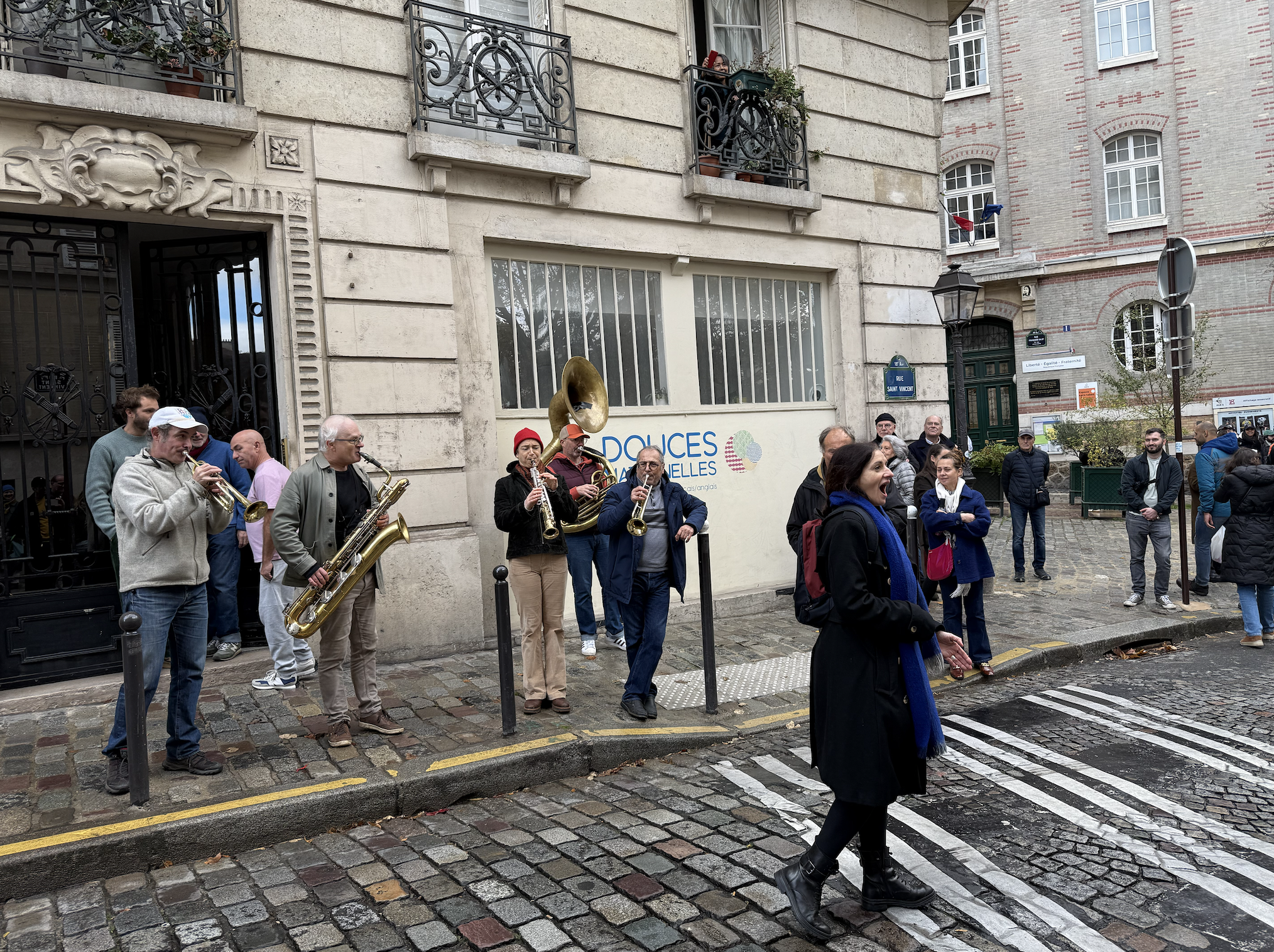
So when they changed location, the now not insubstantial crowd moved with them, up the nearby stairs and next to the rubbed raw bronze breasts of Dalida where the performance continued apace.
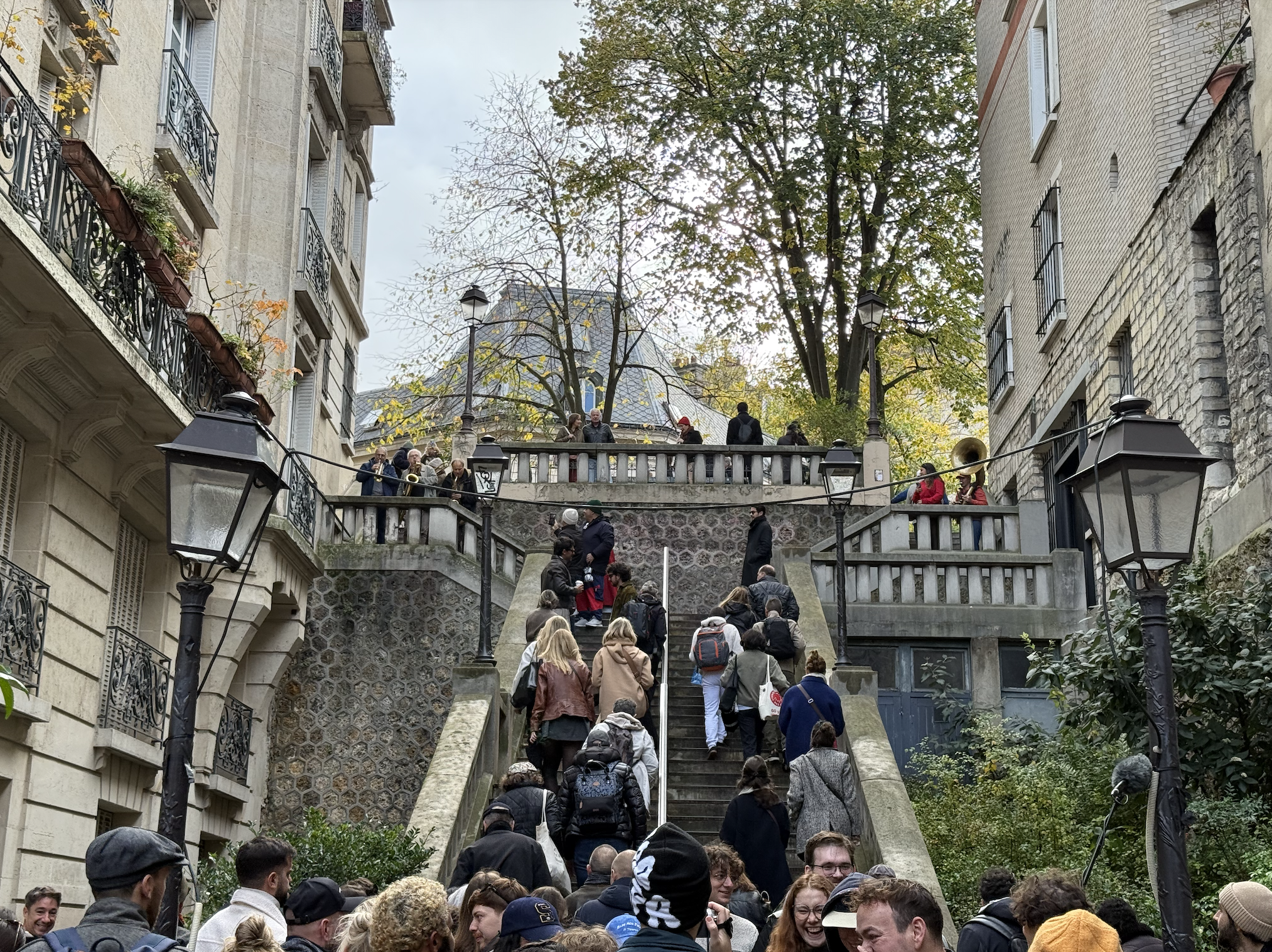
A very light drizzle began to fall – more of a sheen, really – and we stayed and followed the band as it moved again up the cobblestone streets toward the heart of the Sacre Cœur zone. The buzz was palpable. We were all having such a good time. Some 45 minutes after discovering the troupe I finally took my leave and began walking down the streets, past Au Lapin Agile, to my usual circuit.
I never made it.
A single, vindictive cobblestone covered in a toxic combination of moss and rainwater took some ideological opposition to my stride, or perhaps my joy, and toppled me. I went down like a Bourbon king, hard and somehow very precisely, on my right knee. A sharper edged stone punctured a hole in flesh, and possibly nerves, just below my patella before the momentum of the fall pushed my right leg out in front and my left leg under and behind me.
A second of stunned nothing and then seizing pain. Pain pain, not bread. And liquid damp, inside my pant leg, whether from the wet stones or blood I couldn't be sure. Three people who saw it happen rushed to my side and asked if I was OK. Yes, I lied. Then I tried to stand up and almost fell down again.
'You should sit down here,' one of the lovely women told me and I said no, no I can walk even though that remained to be seen. And the remains of my knee could not be seen. I rejected other offers of support, because I am ultimately still a man from regional Australia with a deeply embedded knot of recalcitrant pride, and eventually faltered around the corner, out of sight of others, where I inhaled sharply and considered my options. I was on the other side what I will now call a mountain from my home, so had to hobble the long way around to avoid as many stairs as possible – another 2km almost – and only when I made it to my apartment was I able to assess the damage.
Fair warning. Blood.
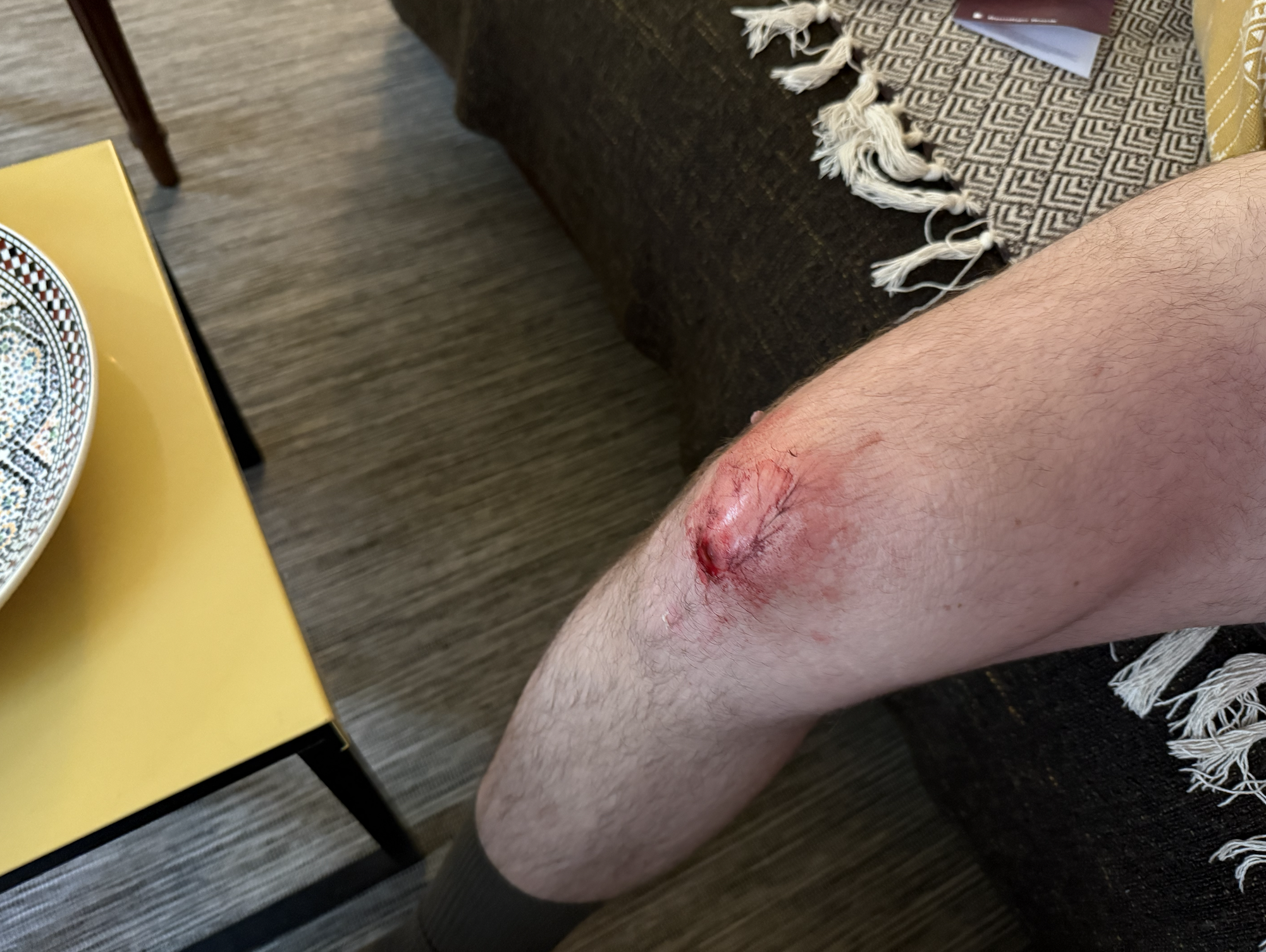
Anyway this story is already taking way longer than I had intended so let's cut through the following five days: I should have gone to see a doctor but I didn't. The knee continued to bleed for a day and a half. It happened on a Sunday so the closest pharmacy to my house was another 1.2km return trip which I tackled after climbing into bed to have a nap. The wound bled through the two bandaids I had and through my sheets. I thought, perhaps, that it was only superficial and swollen on account of the bruising. By the time I'd realised it was not getting better, on the Thursday, I saw a doctor who very loudly and very French-ly said hoo-lah-lah and performed an X-Ray – clear – before recommending an MRI.
Side note: the way the French use what we would traditionally write as ooh-lah-lah is one of the many supreme joys that I have living here. It truly is deployed in the wild by Parisians and the French alike – more on this seemingly artificial divide shortly – and I hear it sometimes a dozen times a day when I am out and about. Phonetically it sounds like haw-lore-lore but all breathy and bunched up in the mouth, like a little roulette ball tumbling over the same two numbers. In my experience, based on context clues alone, it seems to be exclusively used as a sort of 'oh my goodness' and usually in a slightly exasperated or mildly negative sense. So when my doctor said ooh-lah-lah to me, I responded with: don't say ooh-lah-lah! And he laughed.
The MRI had to wait, however, because I was going away that Friday to spend the weekend in the Loire Valley at a 16th century hunting lodge attached to a château not far from the town Azay-sur-Cher for my friend Cordell's birthday. We drove down with fresh produce and delicious wine and arrived just after dark where I immediately set to work chopping what felt like the entire seasonal yield of L'Indre-et-Loire's mushroom crop. There were 13 of us in total – one couple caught four trains from Brussels – and the lodge became a toasty den of food and celebration. A fire crackled beneath a large fresco, also dating to the 1500s, of what we decided was a man being indecent with a dog.
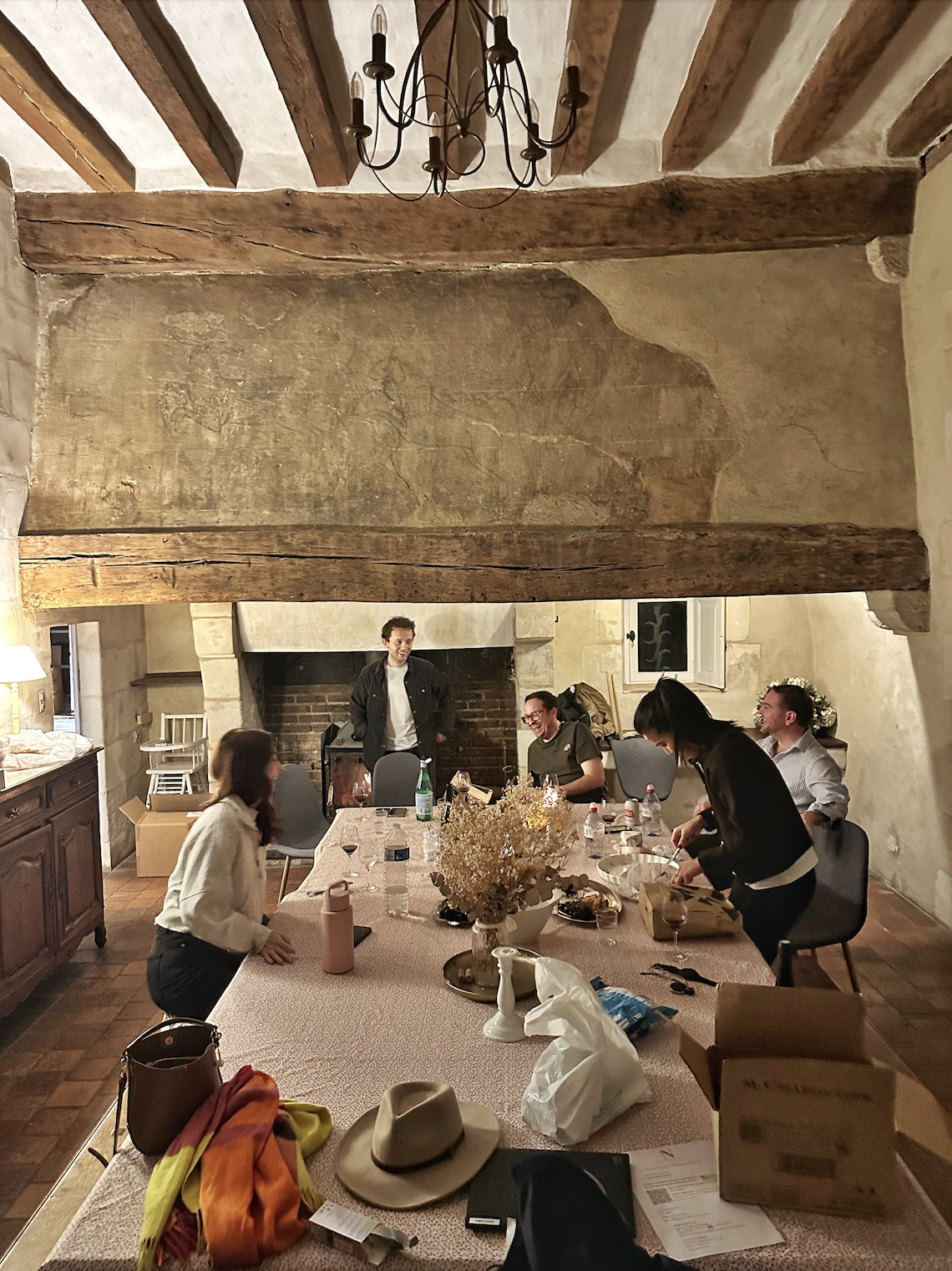
We drank and played Werewolf into the early hours of the morning. I was killed three times, which both upset and thrilled me. The lodge was the perfect setting for spooky narration of things stalking in the night. Unfortunately it also had a staircase leading to our rooms that seemed purpose built to further antagonise my knee. Walking on a flat surface had become bearable but going up, and especially down, stairs was painful and had to be done very slowly, with care.
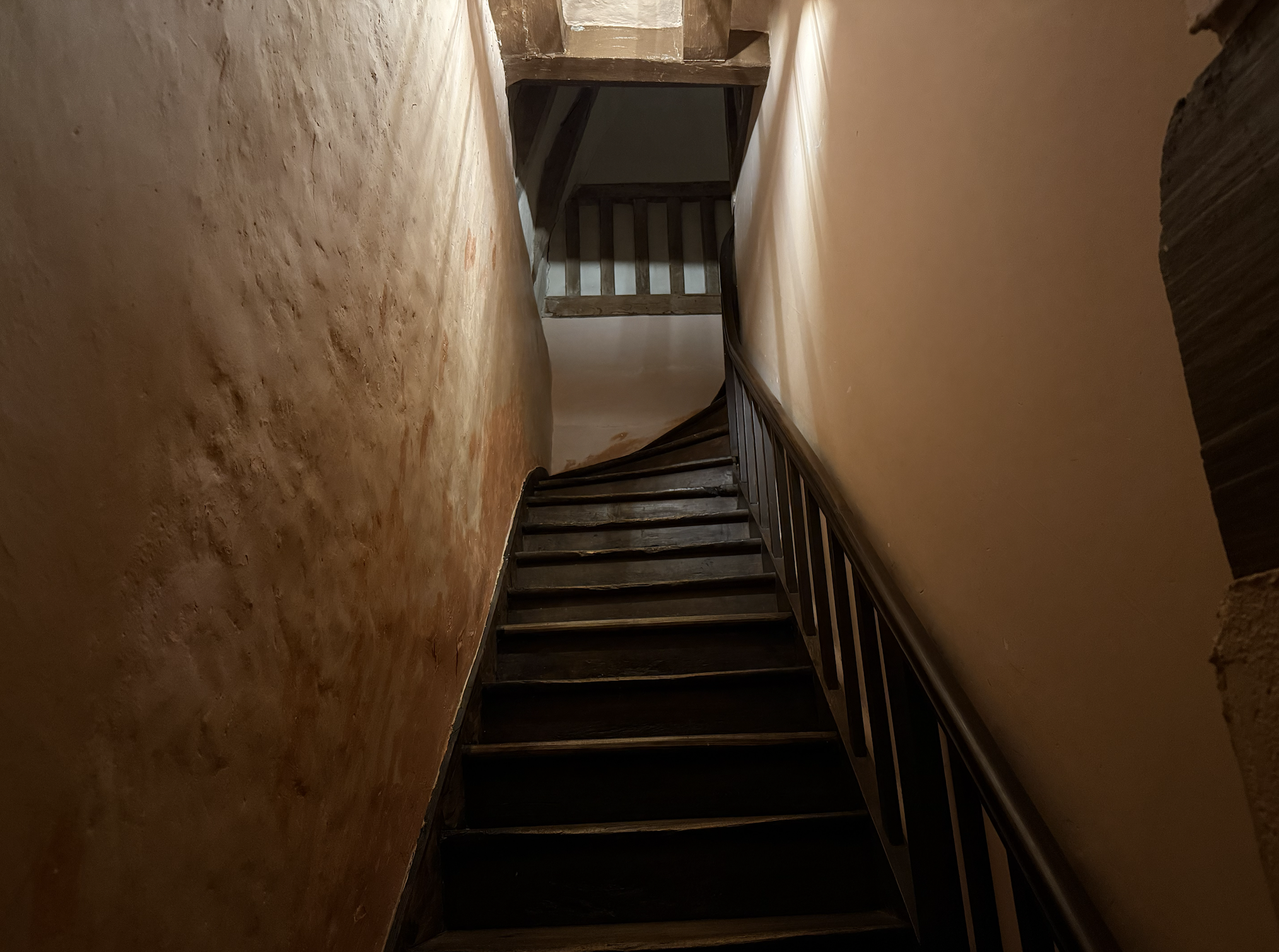
I felt like one of those kids on a school camp, where the teachers arrange physical activities like hikes and ropes courses, who suddenly develops an invisible 'injury' that renders them not only unable to fully participate but constantly explaining why they cannot. 'It's my knee,' I explained every other obstacle, 'I've done my knee, you see.' Eventually all I could talk about was my knee. And Robodebt. Peoples' eyes glazed over as I spoke, like the carrots in the oven. The lodge creaked and shadows fell in strange shapes across the walls.
In the first act of a horror movie, where the friends gather at the isolated house by the woods, I had established myself as one of the textbook characters who speaks too much and is weak of body. Maybe even of spirit. Suspicions about my friends were deepened by the game of Werewolf that had angled our minds to deceit and subterfuge. Thankfully, this was not a horror movie. At least, that is what I told myself as I passed out in the enormous chamber of a room on the top floor.
On Saturday morning, I awoke to the sound of gunshot and brass horns, the very two things most perfectly designed to traumatise a child of Outback Queensland who had just injured himself following a brass instrumental four piece around town. Outside, through the window, two boys cycled in loops on squeaky bikes and crackling gravel. Otherwise they did not really speak or make noises; they were just, sort of, there.
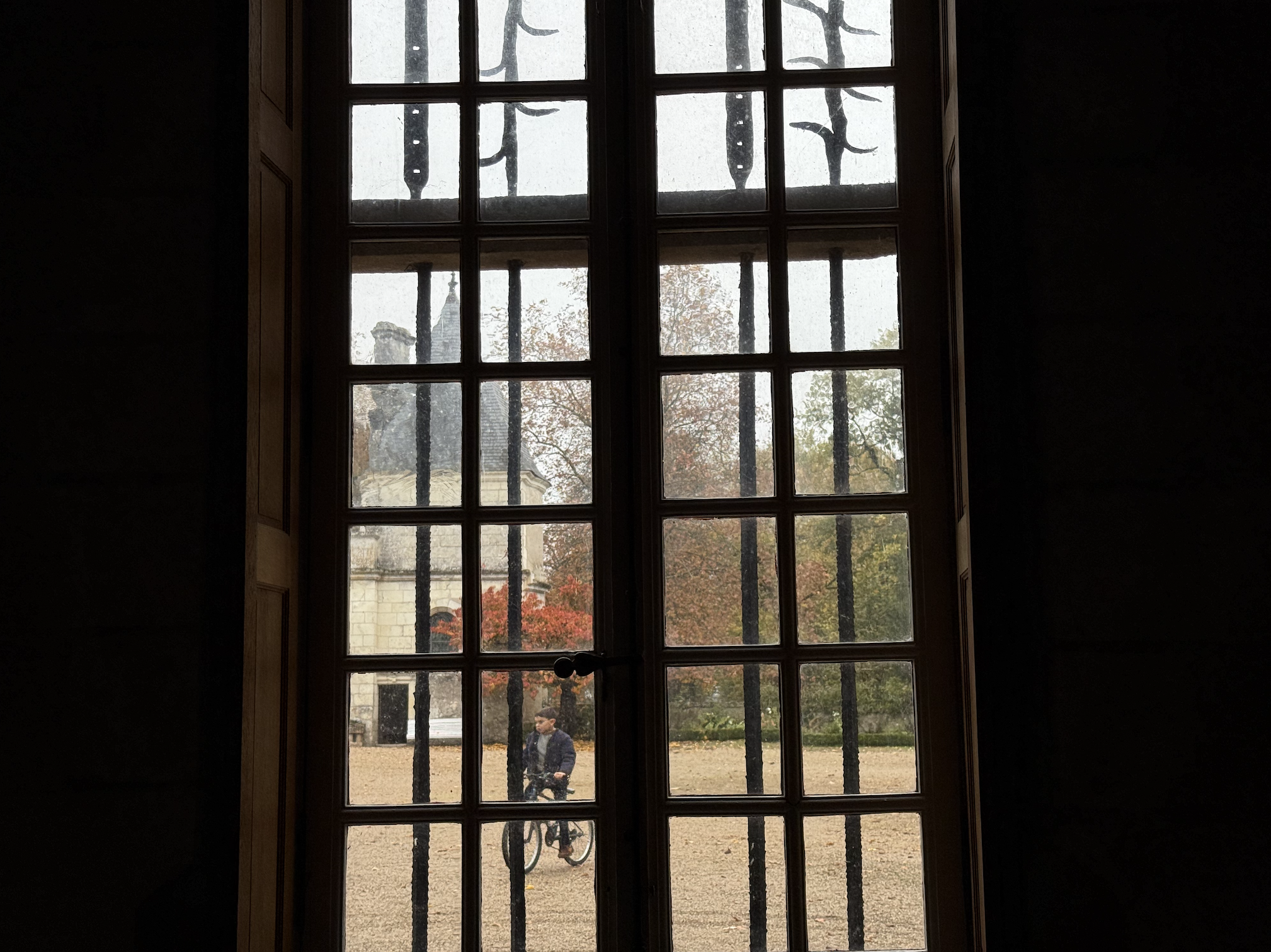
I ventured out to see what was happening and wandered into the middle of an 18th century traditional hunt, la chasse à courre, taking place right there on the castle grounds by our lodge. The château is owned by a family that still lives there and who apparently do not divert from their customs when 13 strangers are staying nearby. And the hunters were wandering in after practice shots in a nearby field to get ready for the official start of proceedings, for indeed, there were proceedings. One must always do admin here.
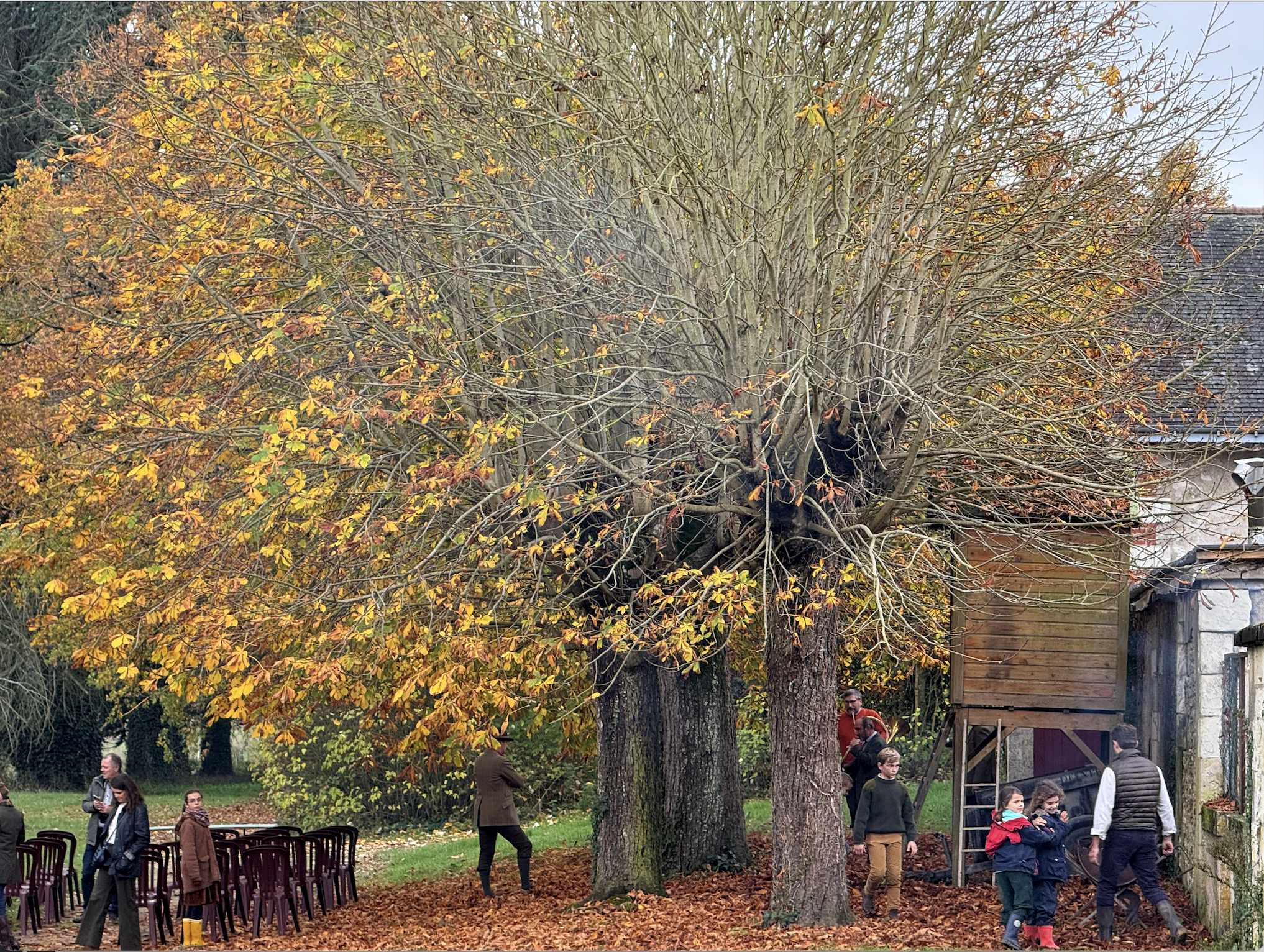
There were rows of empty chairs, brass instruments and children dressed the way I imagine ghosts look. One of them seemed suspiciously like a boyhood version of Prince William whose poorly calibrated time machine had sent him too far into the future and across the Channel.
One of my new friends, a Frenchman called Guillaume, joined me and surveyed the scene with a cool, penetrating gaze.
'This is very right-wing,' he told me.
'Reckon they vote Le Pen?' I asked.
'No, this is even further to the right,' he said.
I had run out of local knowledge.
'What, like Vichy?'
He laughed. The lodge owners said we were perfectly safe to go walking in the woods which I found very surprising. Having just lost the old man, I was worried about getting Dick Cheney-ed but then everyone reminded me I did not look even conceivably like a quail. I am sure that is also what Cheney's friend thought until he ended up with a face full of buckshot.
We went off into the woods anyway, as the group of friends might do in a horror movie. Autumn was in full flush and the castle grounds felt like some deeply enchanted, and only mildly sinister, alternate reality. I asked Guillaume if I could eat some red berries and he said 'probably not' which is just as well because only later did it occur to me that is exactly what a quail would do.
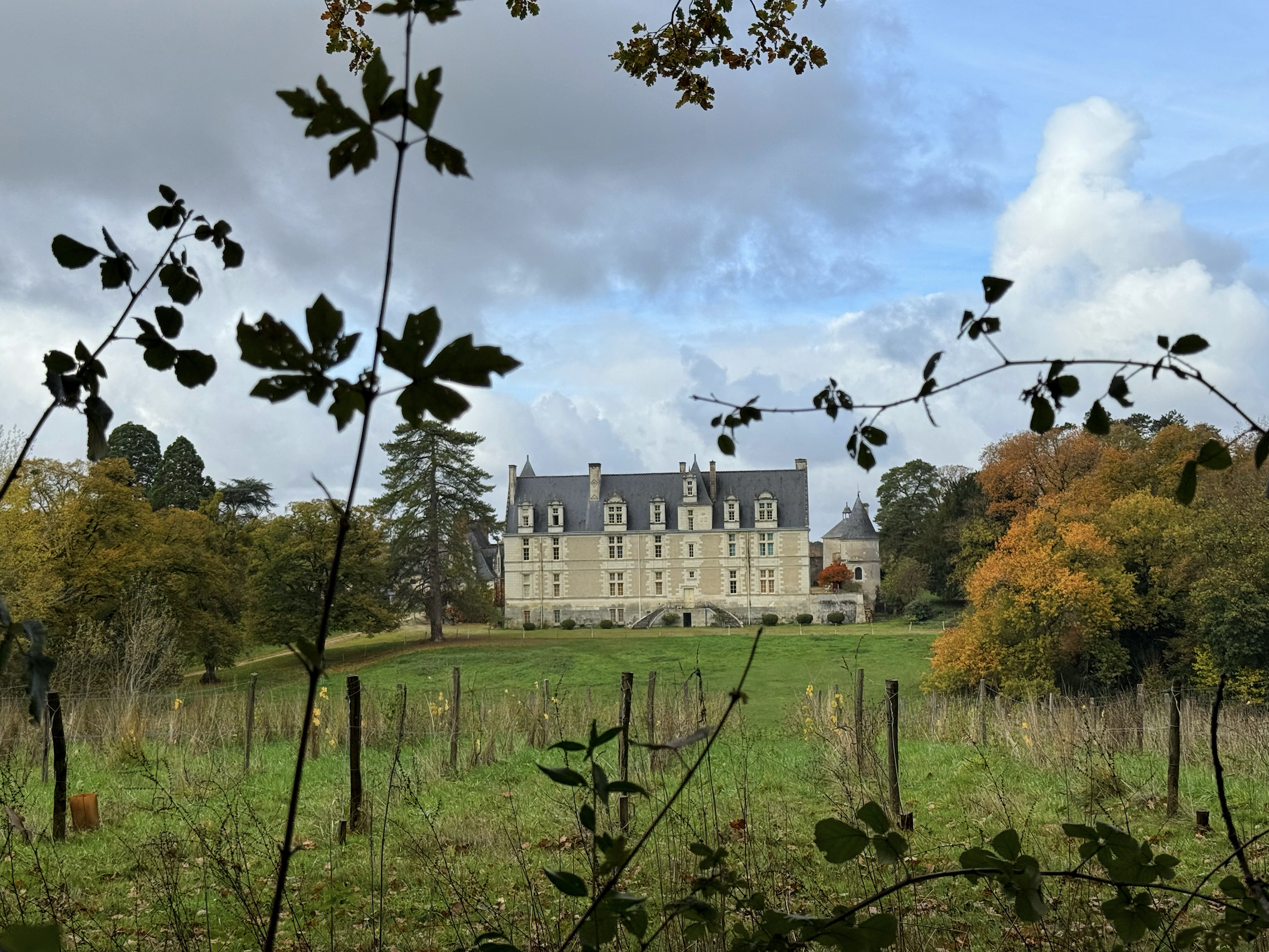
Then things got even stranger.
Shortly after we'd returned, Guillaume messaged the group chat to announce that the ceremony was taking place outside. It was a full Catholic mass, in Latin, held outdoors by what looked like a bishop but I suspect was a priest in high adornment. I later discovered this is called a Saint Hubert Mass and is often traditionally held at the start of November to bless the dogs in the hunt before what is ominously terms the 'honours to the wild boar'.
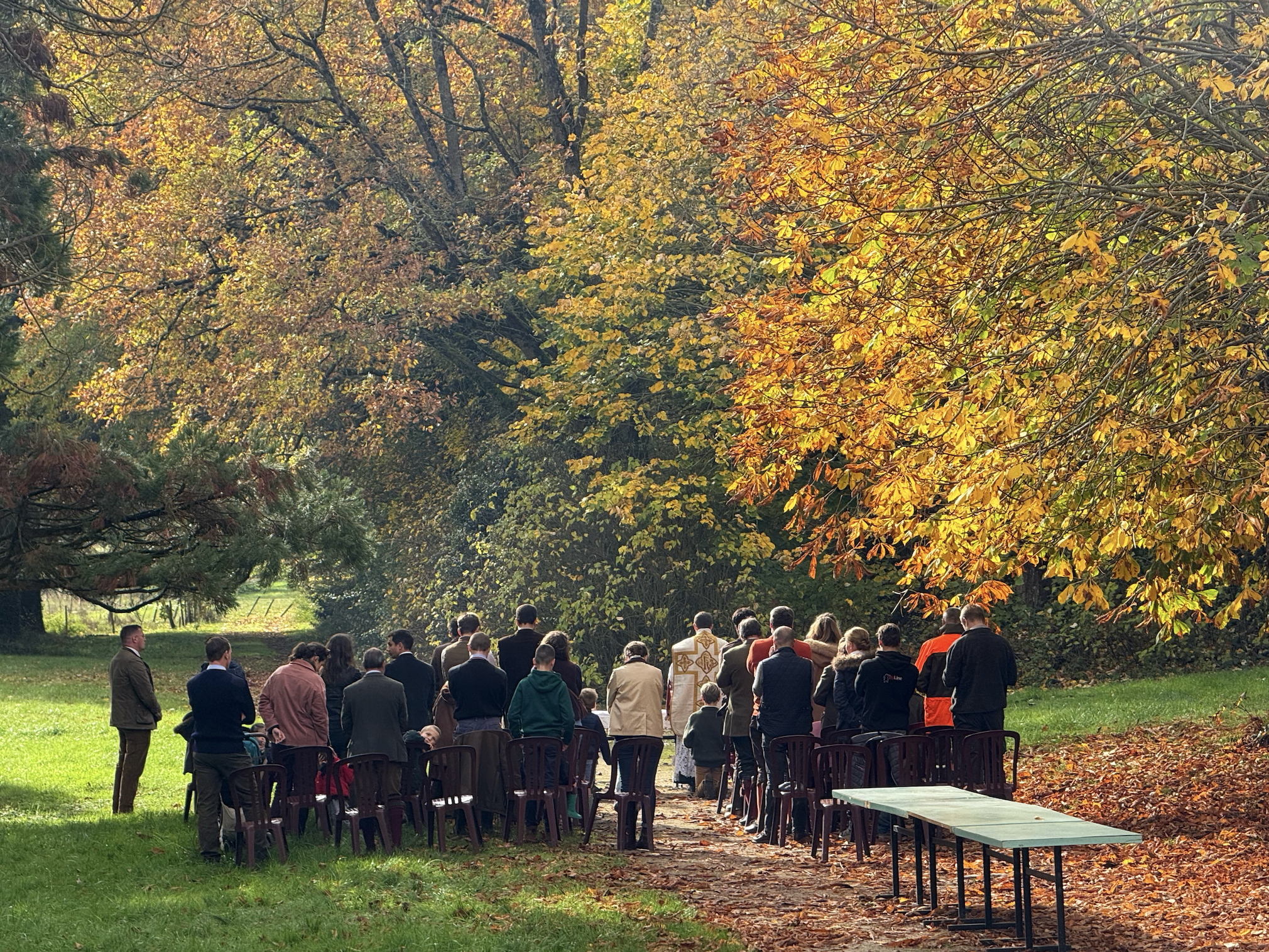
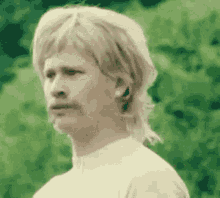
Now we'd introduced the third in the holy trinity of my traumas: Catholicism, gunshot and brass bands.
There is a sizeable rump in France that yearns for a return to the monarchy and not too far from the Loire is a department called the Vendée which was home of the most violent counter-revolutionary uprising in 1973 when the relatively successful peasant farmers took up arms against the revolutionary National Convention. They were not at all enthused by the reforms of the convention and when the more hard done by peasants in other parts of the country engaged in a campaign of Great Fear against their noble landlords – usually by implied threats of personal violence and a zippy bout of burning châteaux – the Vendeans sided with the status quo and did very little. No châteaux were burned which, personally, strikes me as a severe lack of imagination in the 1790s.
Of course, they were deeply, deeply Catholic. The Church had been neutered by the revolution and its God-given king put to the guillotine which, in the Vendée region, was tantamount to an act of war. The strains of the religion are deeper in France than I had appreciated before arriving, and in ways that are both similar to and separate from the way we understand religious power in other places, like back home in Australia for example. Without getting too into the detail, the push-and-pull reached a fervour before, during and after the Paris Commune of the early 1870s, following the capture of Napolean III and the Siege of Paris by the German states under the leadership of the Kingdom of Prussia.
That great loss, according to the then Catholic Archbishop of Nantes Felix Fournier, was divine punishment for the moral decline of the nation following the revolution. What a fuck. It was a dramatic time. The Germans had cut the sole telegraph connection between Paris and the rest of France, the winter was miserable – minus 15C – and the Seine froze for three weeks. The French minister of defence had to escape the city by balloon. By balloon! It must be very difficult to imagine any sort of military victory when you are reliant on wafting to get away. Here's an artist's rendition from the time:
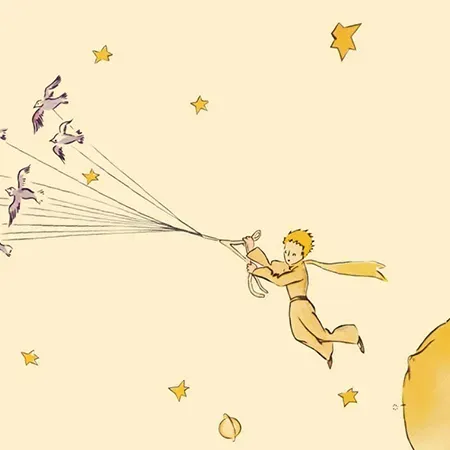
Anyway, the siege led to internal friction about the state of things and the Paris Commune sprang up and attempted to create its own government which lasted for two months – during which time they managed to execute a bunch of priests and the Archbishop of Paris – with the church being charged with 'complicity in crimes of the monarchy'. After the French struck a miserable but necessary deal for peace with the Germans around 400 old cannons were stored around the city. The Commune was born, properly, in Montmartre where some 170 of these cannons were stored on the hill beneath the current site of the Sacre Cœur. It was born because the communards wanted to keep these guns for the protection of the city from the main French national government which, naturally, wanted to take them back under national control. The government tried and failed to seize the cannons and its forces fled Paris after the bloodshed but returned in two months to finally put down the Commune. It was a bloody week in which anywhere between 7000 and 15,000 communards were executed or killed and then it was all over.
The Sacre Cœur had already been suggested by this point in time but its construction was seen as a giant fuck you to the Commune by the Catholics in particular and its destruction has been the official policy of socialist and left political groups in Paris ever since. It was designated a national monument in 2022, a decision that was condemned by those same groups.
This is a long way of explaining what my French friend François told me this week when we were having wine on the hill under the shadow of the church: 'Any right thinking Parisian despises the Sacre Cœur and many want it destroyed.'
Which is an even longer way of saying: the Catholics, man. The hunt, the tradition, the history of the political forces, my injured right knee, no doubt worse for all the genuflecting I had to do as a kid, it somehow seemed all connected
After spying on the mass taking place outside our lodge we decided to make a break for it by visiting another castle, the Château royal d'Ambroise, which also sits high on a hill and overlooks the historic town along the Loire River.
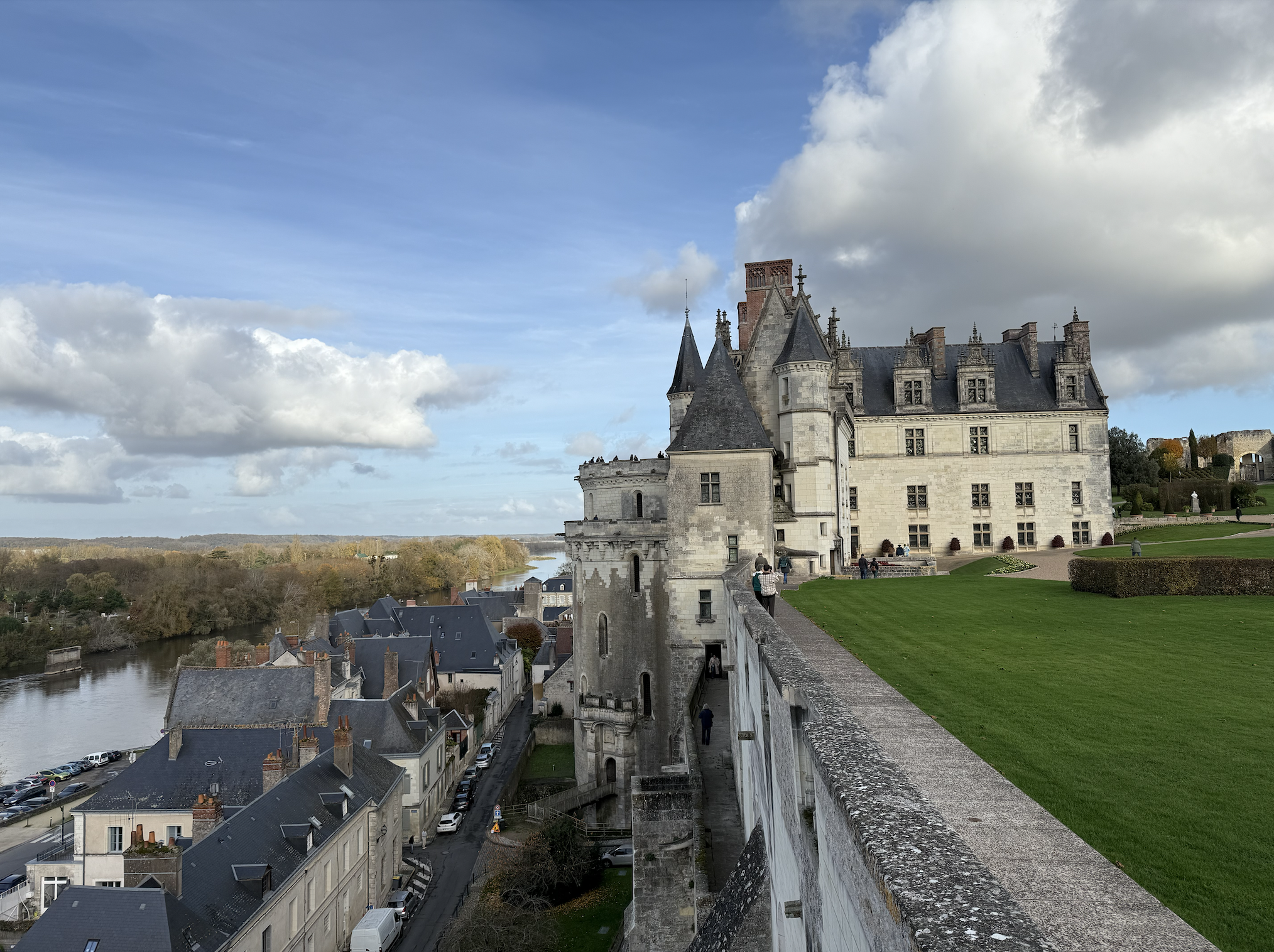
I misgendered the French for 'adult ticket' on entry and the Frenchman behind the kiosk politely corrected me and I responded with: Je suis homme which made everyone in the line wreck themselves with laughter. And then the kiosk man said: 'would you like your brochure in French or English' with a huge smile on his face.
Speaking of geniuses, Leonardo da Vinci is buried here. When French friend Paul told me this it scrambled my little brain. At first, despite obviously knowing that da Vinci was indeed a real human being, I felt surprise that he should have a body and that it should be buried at all. He's from books! And then, after I corrected my surprise, I thought: what the fuck was he doing here! The answer, rather simply, is that the Pope was mean to him. I'm cutting out a bit but that's the thrust of it. Those bloody Cathos again.
And so da Vinci finally responds to the generous overtures of French King François I – after rejecting offers from a previous monarch – and travels to the Loire Valley to take up residence for the final three years of his life. Even da Vinci had to sell out eventually to the highest bidder; it makes me feel marginally better about the state of things today.
This is why the Mona Lisa hangs in the Louvre and not in the famed institutions of Florence and the Italians have been upset about it ever since. And it is why da Vinci lies at rest in the castle chapel, his tomb guarded by the stained glass windows of a jewel that has stood since 1492. Not a single thing adorns it – a missed opportunity for an interactive conical helicopter contraption, if you ask me – but the tiny gothic prayer house itself juts out from a cliff, clings to it, even, above the town of Ambroise so as to give the entire spectacle the air of one of his inventions.
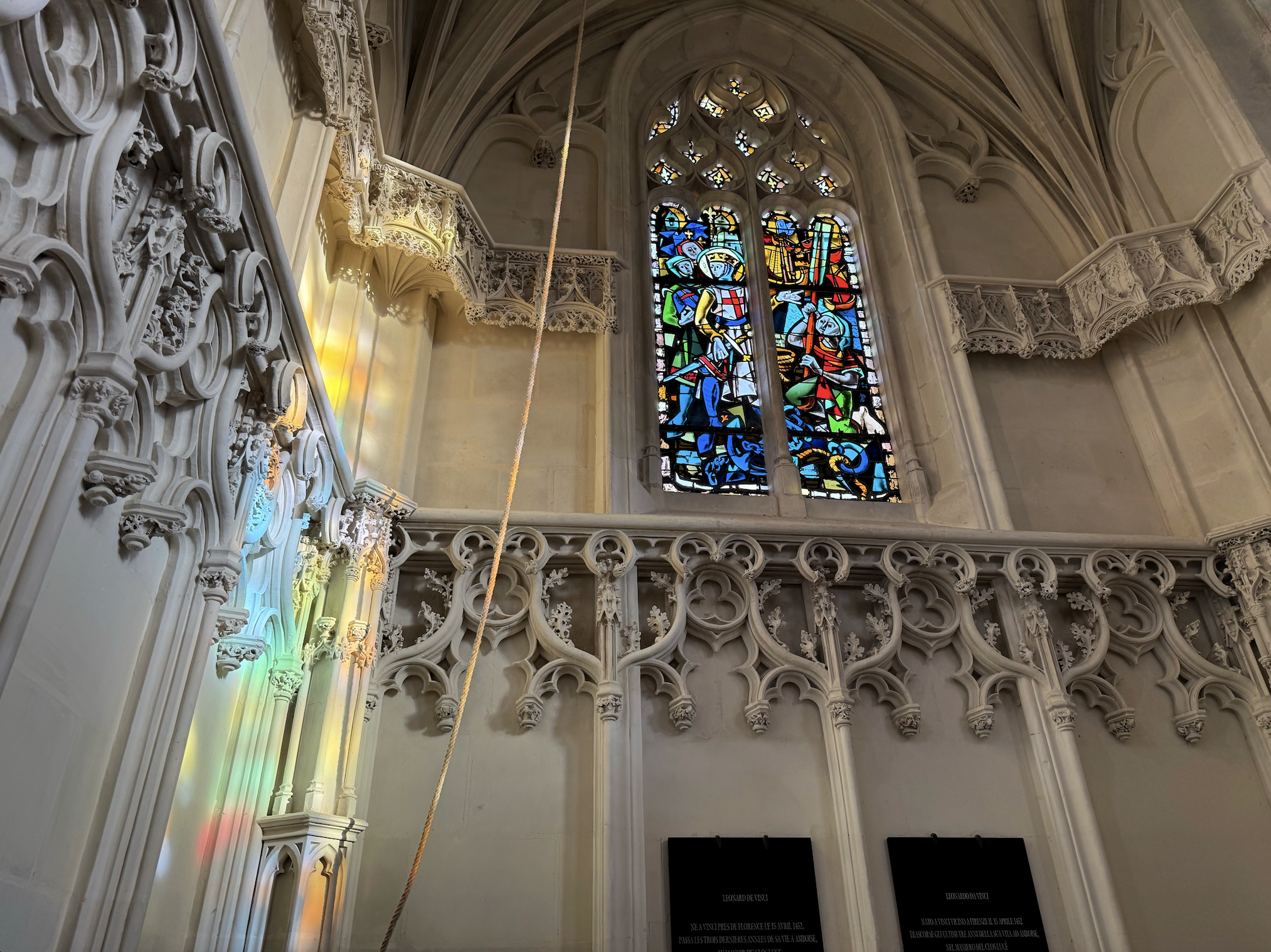
The chapel takes its name from a canonised Catholic, the patron saint of hunting. You guessed it, Saint fucken Hubert. He is also, according to Wikipedia, the 'patron saint of archers, dogs, forest workers, trappers, hunting and huntsmen, opticians, mathematicians, metal workers, smelters and the city of Liège' which gives him slightly fewer portfolio responsbilities than a shadow minister in the Tasmanian parliament.
It should be noted here that, following the death of his wife in childbirth – to a son he chose to call Floribert, which I will ascribe to the grief – Hubert took solace in his favourite noble pastime, hunting, until one morning he came across a stag with a glowing cross between its antlers that told him to seek God. Now as much as I'm personally not into hunting, this story would have been way funnier if he'd shot it in the head anyway. That's what I would have done, out of pure shock if nothing else. Alas, Hubert took it as a sign to become more godly and eventually renounced hunting altogether, even going so far as to ban his clergy from it when he became a priest.
And this was the guy our château hunters were praying to! I offered a counter-prayer, of sorts, and apologised to Hubert for laughing at the name Floribert – and not kneeling while I apologised, on account of my knee, and by the way who was the patron saint of knees, or genoux, I wondered, and doesn't a genou sound like something you'd hunt with a rifle – and then suddenly I saw what looked like a deer out the window and it told me to shut up.
On our return to the lodge we prepped for the centrepiece dinner of the weekend – lots of oysters, fish and a roster of sensational salads and cheeses so nothing overly hypocritical – and played another game of Werewolves (we are almost all in our 30s).
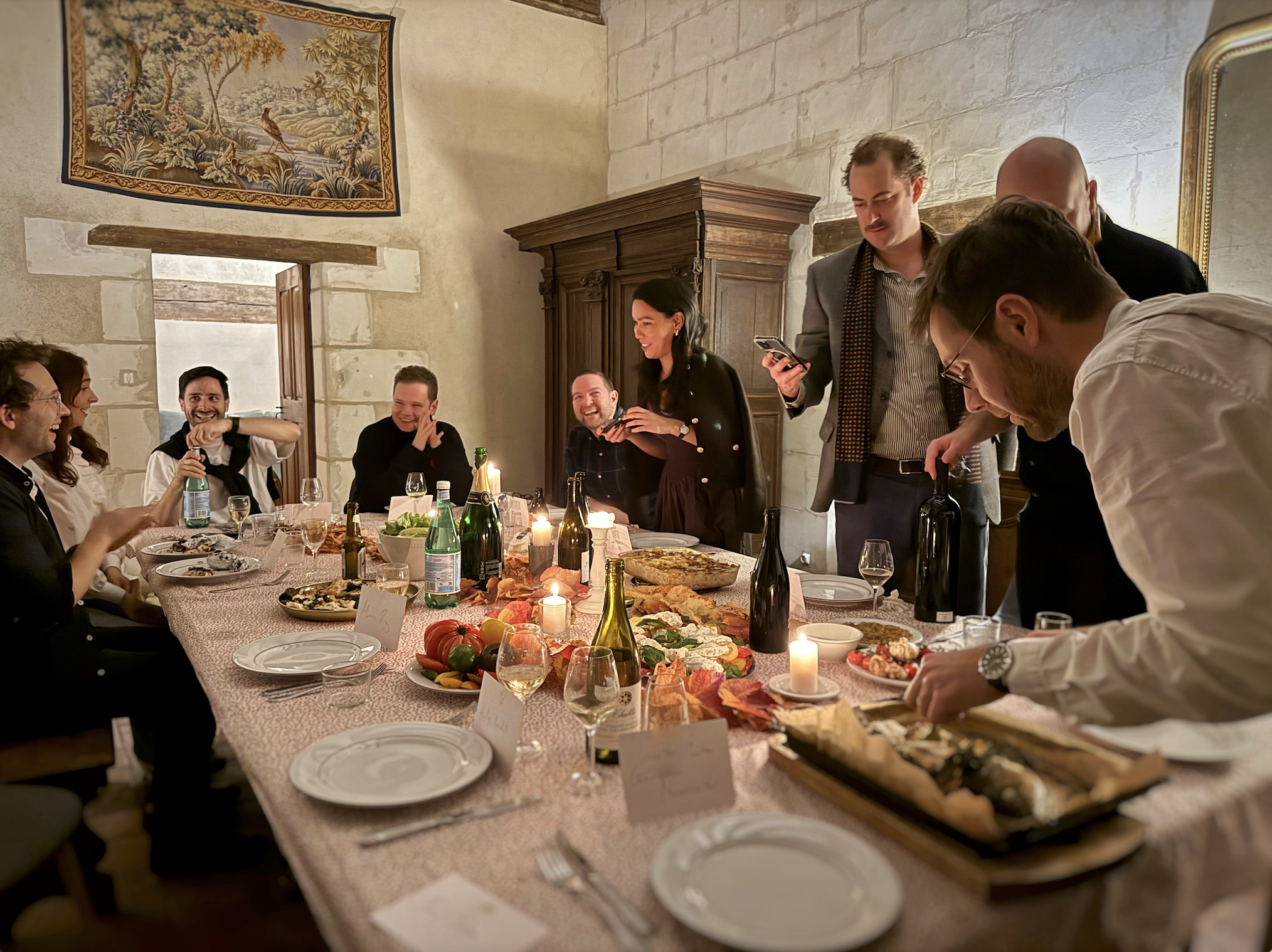
A fog rolled in. That night I dreamed of being chased through a darkened wood on my dicky knee by hounds and hunters, possibly even Hubert himself. I couldn't run in my dream, just like I couldn't run in my waking state then or since. (It has been two weeks without being able to run, after running almost every single day for 18-months). I thought of that Maggie Smith poem, Deer Shield, which ends thus as the narrator drives through the backroads of the USA:
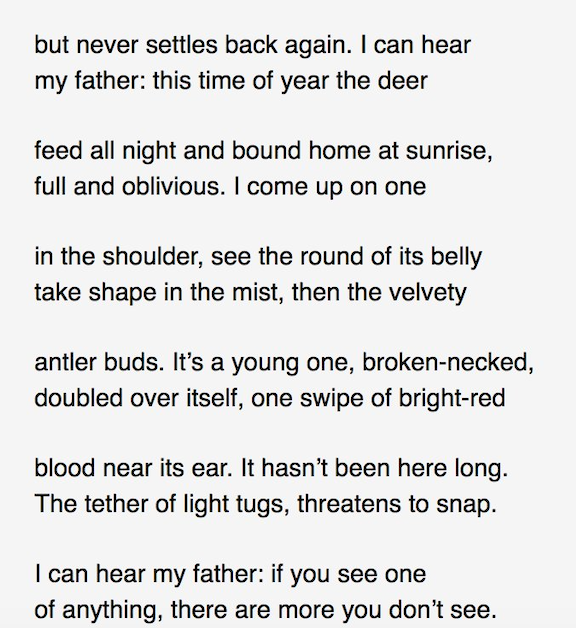
If you see one of anything, there are more you don't see. In the morning, the fog was thick. It was colder than the day before. I went outside to feel the air and watched as a lone man in a cape strode off into the distance, into the fog; into the wood.
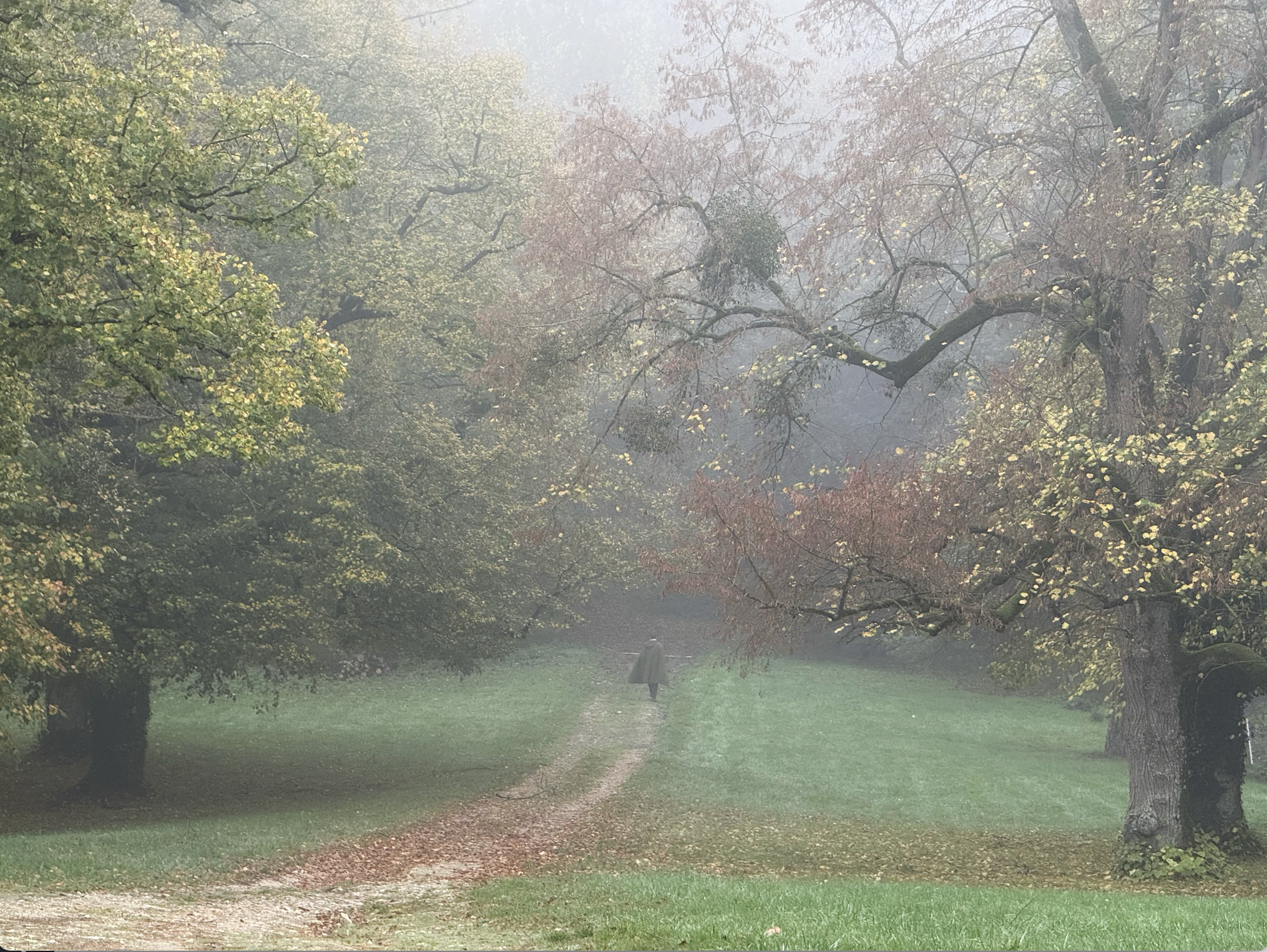
'Hubert?' I whispered.
He never turned around.
Addenda
The Brief Laptop Rebellion
On Monday just gone, I arrived at my local cafe where I work every morning for a few hours and was quietly told they were going to trial a new laptop policy. Unlike large swathes of Paris hospitality which either grimaces and allows restricted hours use or actively bans the computer – a sweet and charming rule that I respect – the Beans on Fire people have always allowed computers at any time Monday to Friday. As such, the place has become something of a haven for the ordinateur crowd. All well and good until one day recently the director was working and noticed every single upstairs table had someone working away on a laptop and customers who were coming in to buy coffee sur place (have in) couldn't actually get a seat and left.
Anyway, the apparent answer to this problem was to introduce a laptop zone on the upstairs floor via the high-tech form of writing on two of them in pen that they were laptop friendly. All the others were laptop unfriendly and of course by Tuesday the first of two working options was already taken and then I took the last one, shortly after opening. Then the other regulars came with their laptops and discovered they were unable to work from their adopted home and they left, despite a large number of tables sitting empty.
By the following day the brief laptop experiment was over. And the only reason I have explained this in the detail I have is because it was necessary to land the remark of the Russian woman who often comes into Beans, sometimes with her cat, when she arrived to see me working away at a table of my choosing on Thursday.
'How come his table is no longer under sanction,' she said in a thick Russian accent.
I joked that I had a Monaco-like carve-out but she did not laugh.
While We're on the Subject
The Russian woman comes into the cafe when I am there about once a week and even though we have spoken to each other very briefly through the presence of another person, usually one of the baristas, she has never spoken with me directly or showed any real interest in doing so. I'm not sure if this is relevant but I think she also works in fashion. Regardless, I find her very funny in her world-weary pronouncements. This week we finally had a conversation – Montmartre, it used to be real, she told me – and then we broadened the chat out with one of the baristas about her dating life and astrology.
'I've dated three Cancer men, from three different cultures,' she said in a tone that telegraphed exactly where this thought would end. 'A Kazakh, a German and a Frenchman. And I'm sorry to say it but Cancer, you're a bitch.'
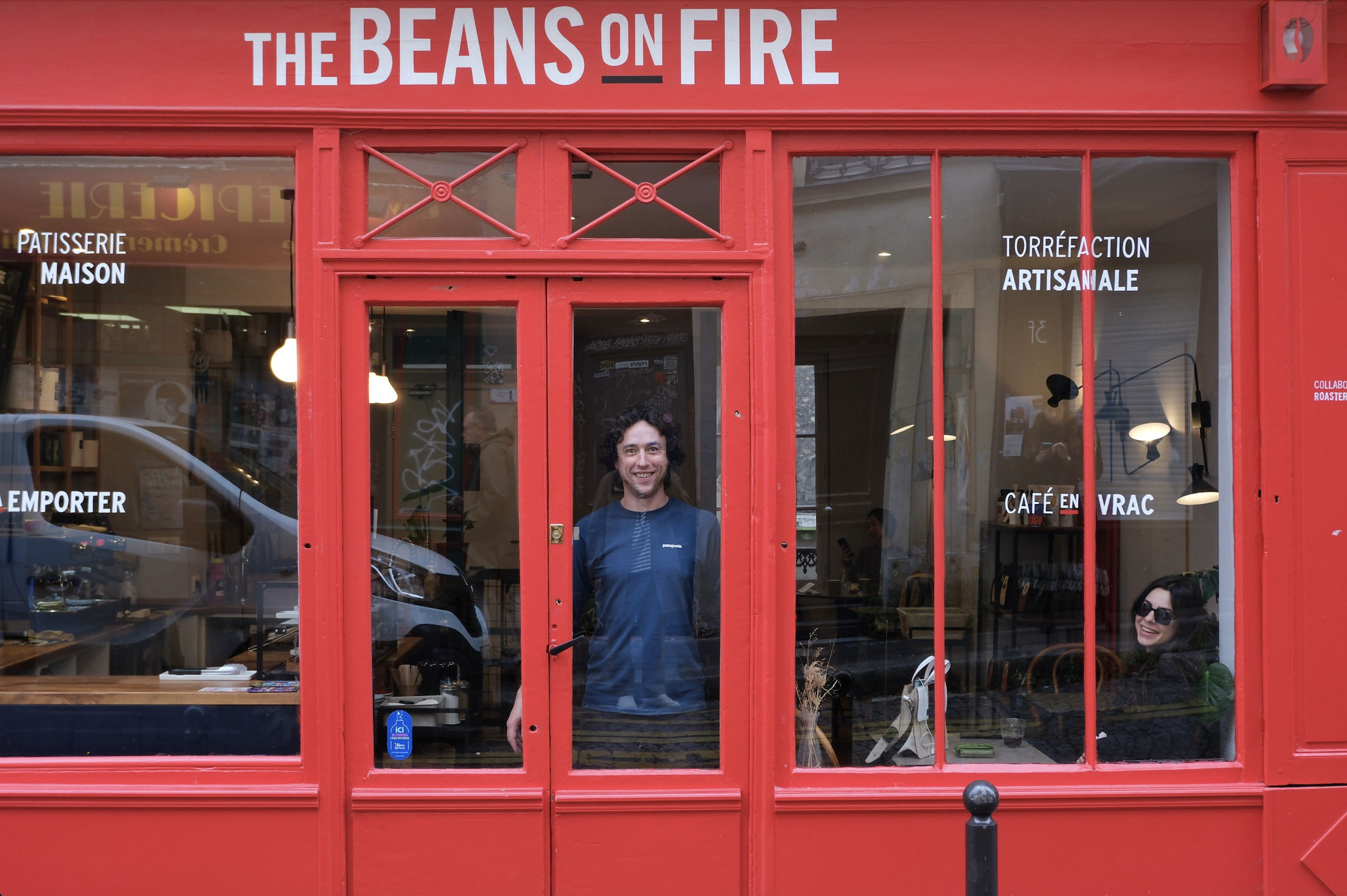
Ciao for Now, Les Naturistes
Through a friend I've made in Paris, Soph, I have also been further drawn into the world of French hospitality. Her partner owns and runs a bar with two others and, until Friday, also a very nice restaurant just around the corner. On Friday night we all turned out for the final party before it was sold and it was heaving.
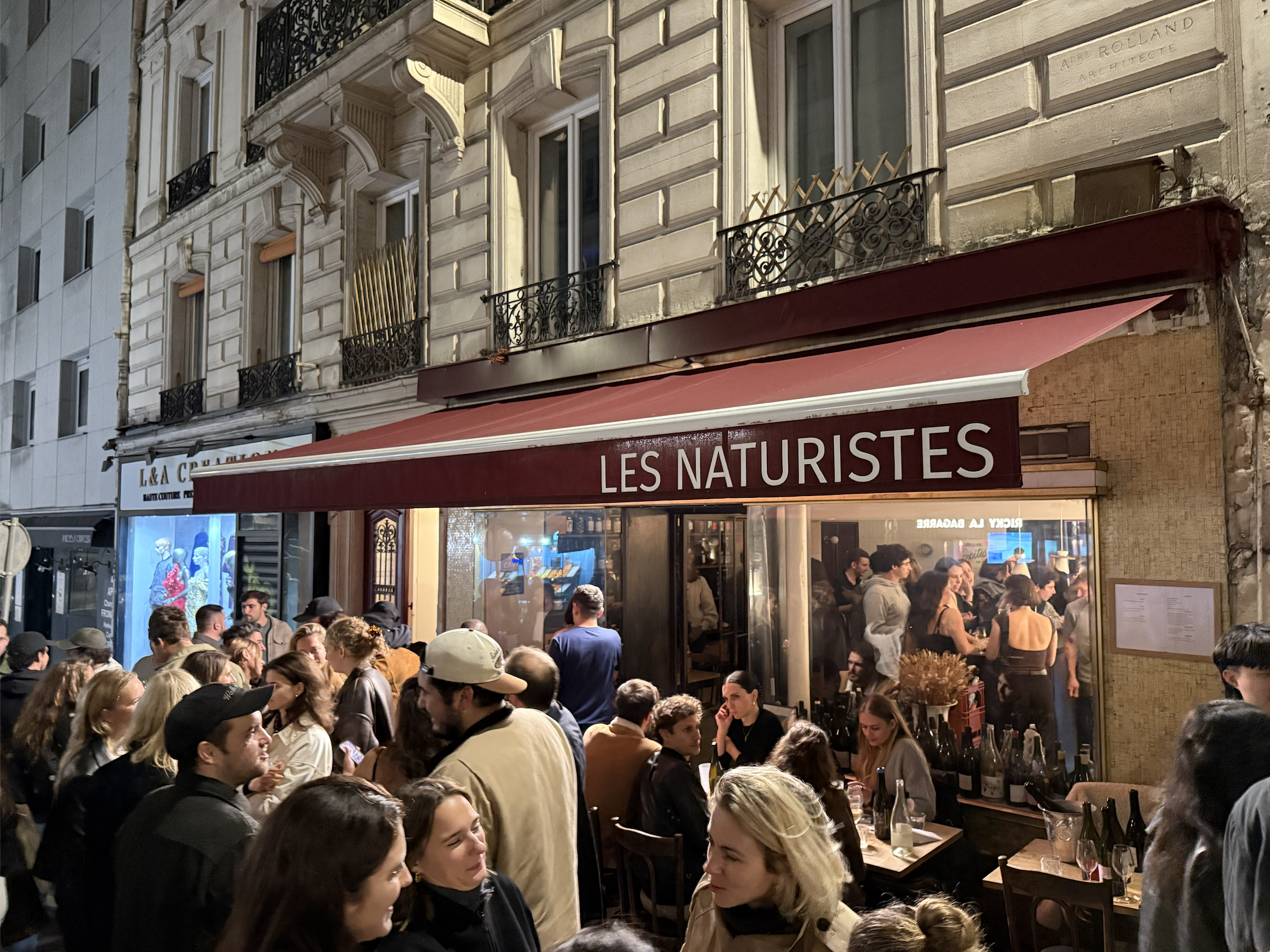
I won't bore you with all of the details except to say it was a very fun night that went into morning hours so small I could actually say the numbers in French.
In one of those hours my friends and I were talking to a very French man called Thomas [Thom-ah] who had volunteered his distaste for English people in particular. No great surprises here, naturally, but he answered in the most profoundly French way when pressed as to what it was, specifically, that he disliked about them.
'I work with a lot of British people,' he said. 'And they keep scheduling meetings in our lunch break'.
To the barricades!
God I love this country.
